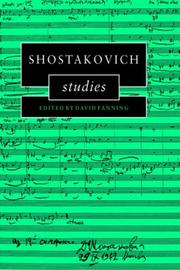| Listing 1 - 10 of 20 | << page >> |
Sort by
|

ISBN: 0754606996 Year: 2004 Publisher: England Ashgate
Abstract | Keywords | Export | Availability | Bookmark
 Loading...
Loading...Choose an application
- Reference Manager
- EndNote
- RefWorks (Direct export to RefWorks)
strijkkwartetten --- Sjostakovitsj, Dmitri --- 526 --- Monografieën componisten --- String quartets --- Analysis, appreciation. --- Shostakovich, Dmitriĭ Dmitrievich, --- Analysis, appreciation --- Shostakovich, Dmitriĭ Dmitrievich, --- Šostakovič, Dmitrij Dmitrijevič. --- Shostakovich, Dmitri

ISBN: 0521446325 0521440882 1139085727 0511612087 051100771X Year: 1997 Publisher: Cambridge : Cambridge University Press,
Abstract | Keywords | Export | Availability | Bookmark
 Loading...
Loading...Choose an application
- Reference Manager
- EndNote
- RefWorks (Direct export to RefWorks)
After the death of Mahler in 1911 the great Austro-German symphonic line was carried on mainly in England, America, Scandinavia and Russia. The Fifth Symphony of Carl Nielsen, Denmark's greatest composer, was composed in 1921-2. David Fanning discusses its place within the symphonic tradition since Beethoven, revealing the personal background to the work and taking full account of the extensive Danish commentaries, including the composer's own, which are given in English for the first time. In an absorbing analysis of the music he lays bare the origins of its images of inertia, anxiety and collapse in Nielsen's tone poems and incidental music for the theatre. Insights are offered into the symphony's 'progressive tonality' and its relationship to traditional structural models.
Book
ISBN: 0861760522 Year: 1981 Publisher: Bradford : MCB university press,
Abstract | Keywords | Export | Availability | Bookmark
 Loading...
Loading...Choose an application
- Reference Manager
- EndNote
- RefWorks (Direct export to RefWorks)
Book
ISBN: 0566022362 Year: 1983 Publisher: Aldershot Gower
Abstract | Keywords | Export | Availability | Bookmark
 Loading...
Loading...Choose an application
- Reference Manager
- EndNote
- RefWorks (Direct export to RefWorks)
Book
ISBN: 9783936000917 Year: 2010 Publisher: Hofheim Wolke
Abstract | Keywords | Export | Availability | Bookmark
 Loading...
Loading...Choose an application
- Reference Manager
- EndNote
- RefWorks (Direct export to RefWorks)
Multi
ISBN: 9780511612084 9780521440882 9780521446327 Year: 1997 Publisher: Cambridge Cambridge University Press
Abstract | Keywords | Export | Availability | Bookmark
 Loading...
Loading...Choose an application
- Reference Manager
- EndNote
- RefWorks (Direct export to RefWorks)

ISBN: 9780754606994 Year: 2004 Publisher: London : Ashgate,
Abstract | Keywords | Export | Availability | Bookmark
 Loading...
Loading...Choose an application
- Reference Manager
- EndNote
- RefWorks (Direct export to RefWorks)

ISBN: 9780511551406 9780521452397 9780521028318 Year: 1995 Publisher: Cambridge Cambridge University Press
Abstract | Keywords | Export | Availability | Bookmark
 Loading...
Loading...Choose an application
- Reference Manager
- EndNote
- RefWorks (Direct export to RefWorks)
Book
ISBN: 9780521842204 9780521603157 0521842204 0521603153 9781139001953 Year: 2008 Publisher: Cambridge Cambridge University Press
Abstract | Keywords | Export | Availability | Bookmark
 Loading...
Loading...Choose an application
- Reference Manager
- EndNote
- RefWorks (Direct export to RefWorks)
As the Soviet Union's foremost composer, Shostakovich's status in the West has always been problematic. Regarded by some as a collaborator, and by others as a symbol of moral resistance, both he and his music met with approval and condemnation in equal measure. The demise of the Communist state has, if anything, been accompanied by a bolstering of his reputation, but critical engagement with his multi-faceted achievements has been patchy. This Companion offers a new starting point and a guide for readers who seek a fuller understanding of Shostakovich's place in the history of music. Bringing together an international team of scholars, the book brings up-to-date research to bear on the full range of Shostakovich's musical output, addressing scholars, students and all those interested in this complex, iconic figure.
Shostakovich, Dmitrii Dmitrievich, --- Criticism and interpretation. --- Shostakovich, Dmitriĭ Dmitrievich, --- Shostakovich, Dmitriĭ Dmitrievich, --- Chostakovitch, D. --- Chostakovitch, Dimitri, --- Chostakovitch, Dmitri, --- Schostakovich, Dmitri Dmitriyevich, --- Schostakovitj, Dmitrij, --- Schostakowisch, Dmitri Dimitriewisch, --- Schostakowitsch, D., --- Schostakowitsch, Dimitri, --- Schostakowitsch, Dmitri, --- Schostakowitsch, Dmitrij, --- Sciostakovic, Dimitri, --- Sciostakovic, Dmitri, --- Sciostakovich, Dmitri, --- Shostakovic, Dmitrij, --- Shostakovich, D. --- Shostakovich, Dimitri, --- Shostakovich, Dmitrij, --- Shostakovich, Dmitry, --- Shostakovitch, Dmitri, --- Sjostakovitj, Dmitri, --- Sjostakovitj, Dmitrij, --- Sjostakovitsj, Dmitri, --- Šostakovič, D. D. --- Šostakovič, D. --- Šostakovič, Dmitrij, --- Šostakovič, Dmitrij Dmitrijevič, --- Šostakovičius, D., --- Šostakovitš, Dmitri, --- Szostakowicz, A., --- Szostakowicz, Dmitri, --- Szostakowicz, Dymitr, --- Шостакович, Дмитрий Дмитриевич, --- שוסטקוביץ׳, דמיטרי, --- Criticism and interpretation --- Shostakovich, Dmitriĭ Dmitrievich --- Шостакович, Дмитрий Дмитриевич --- Schostakowisch, Dmitri Dimitriewisch --- Shostakovich, Dmitriĭ Dmitrievich, - 1906-1975 - Criticism and interpretation --- Shostakovich, Dmitriĭ Dmitrievich, - 1906-1975
Book
ISBN: 1351862588 1315230615 9781351862585 9781315230610 9781351862592 1351862596 9781351862578 135186257X Year: 2020 Publisher: Abingdon, Oxon ; New York, NY : Routledge,
Abstract | Keywords | Export | Availability | Bookmark
 Loading...
Loading...Choose an application
- Reference Manager
- EndNote
- RefWorks (Direct export to RefWorks)
Following their entry into Austria and the Sudetenland in the late 1930s, the Germans attempted to impose a policy of cultural imperialism on the countries they went on to occupy during World War II. Almost all music institutions in the occupied lands came under direct German control or were subject to severe scrutiny and censorship, the prime objective being to change the musical fabric of these nations andforce them to submit tothe strictures of Nazi ideology. This pioneering collection of essays is the first in the English language to look in more detail at the musical consequences of German occupation during a dark period in European history. It embraces a wide range of issues, presenting case studies involving musical activity in a number of occupied European cities, as well as in countries that were part of the Axis or had established close diplomatic relations with Germany. The wartime careers and creative outputs of individual musicians who were faced with the dilemma of eithercomplying with or resisting the impositions of the occupiers are explored. In addition, there is some reflection on the post-war implications of German occupationfor the musical environment in Europe. Music under German Occupation is written for allmusic-lovers, students, professionals and academics who haveparticular interests in 20th-century music and/or the vicissitudes of European cultural life during World War II.
| Listing 1 - 10 of 20 | << page >> |
Sort by
|

 Search
Search Feedback
Feedback About UniCat
About UniCat  Help
Help News
News